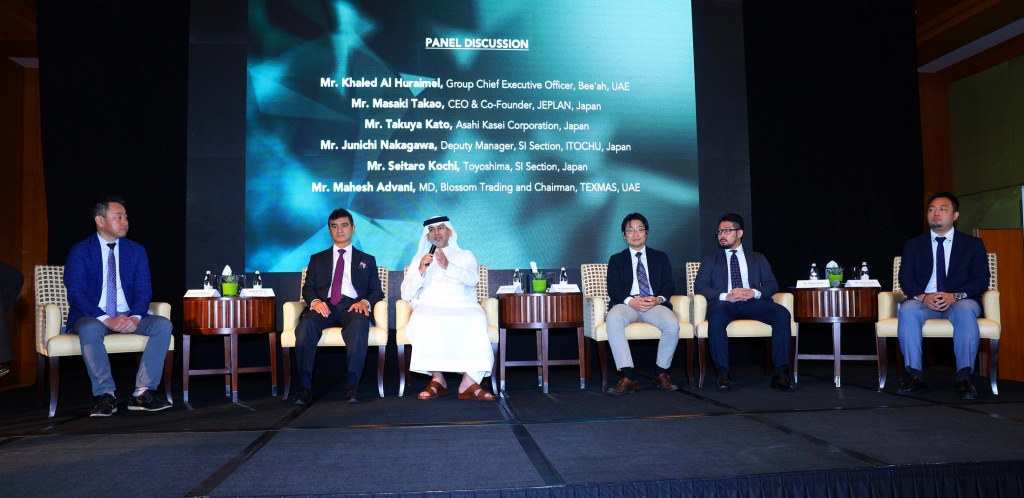
Innovative manufacturing technologies can help boost sustainability, say textile industry leaders
Innovative technologies can be the answer to a greener footprint within the hydrocarbon dependent textile industry, concluded industry experts at a panel discussion titled ‘How Sustainable is Sustainability?’ held at the Ritz-Carlton, DIFC, Dubai on April 9.
Attended by leaders from the public and private sector, the panel was organised by Blossom Trading, one of the largest importers of Dishdasha / Kandoora materials from Japan catering to the GCC, Iraq & Yemen markets, in association with Itochu, one of Japan’s largest trading companies.
The event was held as part of a high-level Japanese delegation visiting Dubai to unveil a new revolutionary technology that manufactures resins using old recycled clothes rather than buying hydrocarbon-based pellets to create new fabric. The delegation seeks investment from local businesses for this project.
The event was attended by His Excellency Ali Ibrahim Mohammed, Deputy Director General and Mohammed Shael AlSaadi, CEO, Corporate Strategic Affairs Sector of Dubai Economic Development Department.
The panelists included Khaled Al Huraimel, Group Chief Executive Officer, Bee'ah, UAE; Masaki Takao, CEO & Co-Founder, JEPLAN, Japan; Takuya Kato, Asahi Kasei Corporation, Japan; Junichi Nakagawa, Deputy Manager, SI Section, ITOCHU, Japan; Seitaro Kochi, Toyoshima, Japan and Mahesh Advani, MD, Blossom Trading & Chairman, TEXMAS, UAE.
Delegates at the panel discussion heard that the global US$1,200 billion garment industry will greatly benefit from new technologies that are created to tackle sustainability issues facing the sector such as greater use of energy and water.
During the course of the discussion, it was revealed that the manufacturing plant, estimated at an initial investment of US$30 million, is aimed at being set up in Dubai to manufacture pellets that are created from old clothes that are broken down into raw material. The investment model following the public-private-partnership (PPP) approach to attract investment from local businesses in the UAE with Japanese expertise and knowledge sharing.
Masaki Takao, CEO & Co-Founder of JEPLAN (Japan Environmental Planning), explained during the panel how the successful pilot plant in Japan set up in 2017 and spread over 10,000 square meters, breaks down old clothes with polyester and cotton fibre through a recycling process to create PET pellets. These pellets are then used to manufacture new fabric that is then put back into the supply chain for a variety of uses including the fashion industry.
Mahesh Advani Managing Director of Blossom Trading and Chairman Texmas (Textile Merchant group) explained further: “The UAE textile industry is the country’s largest trading sector after oil. UAE’s textiles exports cover more than 90 countries in Africa, the Middle East, South Asia and Europe, while major exporters are China, South Korea, Japan and Asia. Dubai continues to witness transformational growth, largely driven by the emirate’s ability to adopt innovative technology solutions. With JEPLAN’s new technology aimed at setting up a factory in Dubai to manufacture the raw material required to create sustainable textile products, we will tick all the boxes on our journey towards a greener future.”
JEPLAN’s technology is already being used by high-end retailers such as H&M for whom the Japanese company is making clothing by dissolving polyester fibre from used garb, purifying it and then turning it into a polyester resin that can be used again as raw material for polyester.
The commercial benefits of the manufacturing process will save the textile industry millions of dollars every year as it weans its dependence away from the hydrocarbon industry.
























